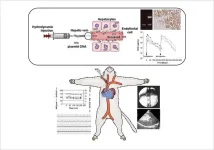(Press-News.org) Statement Highlights:
A new American Heart Association scientific statement focuses on treatment strategies for pediatric cardiomyopathy (diseases of the heart muscle’s structure and function that may lead to heart failure and death) and is a companion to a 2019 scientific statement focused on diagnosis of the condition.
There are several types of cardiomyopathies in children, and treatment should include personalized therapies based on the root cause, symptoms and progression of the condition in each child, according to the new scientific statement.
Embargoed until 4 a.m. CT/5 a.m. ET, Thursday, June 8, 2023
DALLAS, June 8, 2023 — Treating children with cardiomyopathy should be personalized based on the root cause, symptoms and progression of the condition in each child , according to a new American Heart Association scientific statement published today in the Association’s flagship, peer-reviewed journal Circulation.
Cardiomyopathy is a disease of the heart muscle that may make it difficult for the heart to pump blood to the rest of the body and may lead to heart failure and death. There are several types of pediatric cardiomyopathies, and they are all rare yet life-threatening conditions. They affect 1 of every 100,000 children, according to population-based studies in the United States, Finland and Australia.
The new scientific statement, the first to focus on treatment for cardiomyopathy in children, emphasizes important differences among the various types of treatments for cardiomyopathies and heart failure in children and adults. The statement is a companion to the Association’s 2019 scientific statement focused on the diagnosis of pediatric cardiomyopathy.
“Children’s cardiomyopathies may have similar names to cardiomyopathies in adults; however, they often have very different causes, different risk factors, different paths of progression and different outcomes,” said Steven E. Lipshultz, M.D., FAHA, chair of the statement writing group. “Children don’t have the same behavioral or environmental factors contributing to cardiomyopathy — in general, they don’t smoke; they don’t drink alcohol; they don’t have long-standing conditions such as obesity or Type 2 diabetes. So, treatments in children, which may range from replacing missing enzymes to heart transplantation, must be tailored to the root causes of their cardiomyopathy.”
Many of the causes of cardiomyopathy in children are related to genetic abnormalities — rather than Type 2 diabetes, alcoholism, long-term high blood pressure or family history, as seen in adults. Symptoms of cardiomyopathy in children may include difficulty breathing; heart palpitations; fainting during physical activity; swelling in the ankles, feet, legs, abdomen, or congestion of neck veins; or heart failure symptoms, such as trouble breathing, poor feeding or growth, excessive sweating, low blood pressure or fatigue.
The statement writing committee focused on treatment for the most common cardiomyopathies in children:
Dilated cardiomyopathy occurs when the heart is enlarged and the pumping chambers contract poorly.
Hypertrophic cardiomyopathy is characterized by a thickened, stiff heart muscle, making it difficult for the heart to relax and for blood to fill the heart’s chambers.
Restrictive cardiomyopathy is a rare form of heart muscle disease in which the stiffened heart muscle does not allow the ventricular chambers to fill with blood normally, backing up blood into the atria (the top chambers of the heart), lungs and body, causing the symptoms and signs of heart failure.
Pediatric cardiomyopathy may be diagnosed in a variety of stages — some patients may carry a genetic abnormality for the condition yet have no symptoms, while others may have severe symptoms or end-stage disease, according to the statement writing committee. Physicians are urged to thoroughly examine and evaluate their pediatric patients to identify the root cause of the condition to develop a treatment plan.
“Genetic testing of all children with cardiomyopathy is prudent and is likely to have clinical value,” said Lipshultz, who is also a professor in the department of pediatrics and former chair of pediatrics at the University at Buffalo’s Jacobs School of Medicine and Biomedical Sciences in Buffalo, New York. ”Such genetic screening may result in financial and emotional cost savings.”
Other key points from the statement writing committee:
Treatment may be initiated in some pediatric patients who are at risk for cardiomyopathy before they develop symptoms to diminish the progression of the disease.
Adult heart failure treatments have limited effectiveness in pediatric dilated cardiomyopathy, yet some evidence suggests their use has contributed to a decrease in the death rate among children with the condition.
Therapies to prevent sudden death in children with hypertrophic cardiomyopathies, including exercise limitations or an internal defibrillator, continue to evolve and have age- and size-specific parameters compared to adult treatments and devices.
A heart transplant is an acceptable treatment for end-stage pediatric cardiomyopathy. While ventricular assist devices are commonly used as a temporary measure while awaiting a heart transplant, the devices are associated with a low rate of ventricular recovery, similar to the results among adults.
“The future is promising, as limitations in sample size and funding in pediatric clinical trials now are being addressed with the use of learning networks involving multiple pediatric cardiomyopathy centers,” Lipshultz said. “Innovative use of multi-center registries and adaptive trial design have the potential to advance and refine future cause-specific therapy options for pediatric cardiomyopathy. ”
This scientific statement was developed on behalf of the American Heart Association’s Young Hearts Pediatric Heart Failure and Transplantation Committee of the Council on Lifelong Congenital Heart Disease and Heart Health in the Young (Young Hearts). Scientific statements promote greater awareness about cardiovascular diseases and stroke issues and help facilitate informed health care decisions. Scientific statements outline what is currently known about a topic and what areas need additional research. While scientific statements inform the development of guidelines, they do not make treatment recommendations. American Heart Association guidelines provide the Association’s official clinical practice recommendations.
Co-authors are Vice Chair Charles E. Canter, M.D., FAHA; Carmel Bogle, M.D.; Steven D. Colan, M.D.; Shelley D. Miyamoto, M.D., FAHA; Swati Choudhry, M.D.; Nathanya Baez-Hernandez, M.D.; Molly M. Brickler, A.P.N.P.; Brian Feingold, M.D., FAHA; Ashwin K. Lal, M.D., FAHA; and Teresa M. Lee, M.D. Authors’ disclosures are listed in the manuscript.
The Association receives funding primarily from individuals. Foundations and corporations (including pharmaceutical, device manufacturers and other companies) also make donations and fund specific Association programs and events. The Association has strict policies to prevent these relationships from influencing the science content. Revenues from pharmaceutical and biotech companies, device manufacturers and health insurance providers, and the Association’s overall financial information are available here.
Additional Resources:
Multimedia is available on right column of release link https://newsroom.heart.org/news/identifying-the-cause-of-heart-muscle-disease-in-children-is-key-to-effective-treatment?preview=b7157185ec5faea713cb1f4206cfff3e
Spanish news release (to be added)
After June 8, view the manuscript online.
AHA news release: What is known – and not known – about heart muscle diseases in children (May 2019)
AHA health information: Pediatric Cardiomyopathies
AHA health information: Commonly Asked Questions About Children and Heart Disease
AHA health information: Congenital Heart Defects
Follow AHA/ASA news on Twitter @HeartNews
Follow news from the AHA’s flagship journal Circulation @CircAHA
About the American Heart Association
The American Heart Association is a relentless force for a world of longer, healthier lives. We are dedicated to ensuring equitable health in all communities. Through collaboration with numerous organizations, and powered by millions of volunteers, we fund innovative research, advocate for the public's health and share lifesaving resources. The Dallas-based organization has been a leading source of health information for nearly a century. Connect with us on heart.org, Facebook, Twitter or by calling 1-800-AHA-USA1.
###
END
Identifying the cause of heart muscle disease in children is key to effective treatment
Treatment strategies for pediatric cardiomyopathy detailed in new scientific statement from the American Heart Association
2023-06-08
ELSE PRESS RELEASES FROM THIS DATE:
Why earthquakes happen more frequently in Britain than Ireland
2023-06-08
Researchers from the University of Cambridge and the Dublin Institute for Advanced Studies have discovered that variations in the thickness of tectonic plates relate directly to the distribution of earthquakes in Britain, Ireland and around the world.
The study also solves an enduring mystery as to why small earthquakes happen frequently in Britain but are almost completely absent from neighbouring Ireland.
The researchers produced a computer-generated image of Earth’s interior using a technique called seismic tomography, which works in a similar way to a medical CT scan. The data they collected revealed variations in the thickness of the ...
Greenhouse gas emissions at ‘an all-time high’ - and it is causing an unprecedented rate of global warming, say scientists
2023-06-08
University of Leeds Press Release
Under embargo until 09.00 am (British Summer Time) on Thursday, June 8
**With details of a linked press conference at the UNFCC meeting in Bonn - see under notes to journalists**
Greenhouse gas emissions at ‘an all-time high’ - and it is causing an unprecedented rate of global warming, say scientists
Human-induced ...
Birmingham spinout to develop 20-minute test following surge in sexually transmitted infections
2023-06-08
University of Birmingham spinout Linear Diagnostics has received funding to finesse a point-of-care test for rapid diagnosis of gonorrhoea and Chlamydia in men who have sex with men (MSM), and women who have sex with women (WSW).
The funding from the National Institute of Health and Social Care Research (NIHR) will cover essential work to optimise and validate Linear’s platform technology (LDx-CTNG), so it can diagnose infection from rectal and pharyngeal (throat) swabs.
Gonorrhoea and Chlamydia are both major public health concerns. While Chlamydia remains the most commonly detected sexually ...
Study finds socially tolerant monkeys have better impulse control
2023-06-08
Researchers have tested one of the ideas put forward to explain how humanity evolved to become smarter, on non-human primates.
The study, led by a team at the University of Portsmouth, found a significant connection between social organisation and cognitive skills in monkeys.
They assessed three species of macaques with different social tolerance levels, from authoritarian to more relaxed societies, in a series of cognitive touchscreen touchscreen tasks to work out how impulsive and reactive ...
Shirley Ryan AbilityLab receives $8.7 Million NIH grant for first-of-its-kind bionic arm osseointegration study
2023-06-08
Today, an estimated 41,000 people in the United States live with the loss of an upper limb, including hundreds of service men and women. Although significant progress has been made in the durability, control and function of upper-limb prosthetic devices, they lack complete integration into the body and, importantly, do not enable their users to feel.
Now, with the award of an $8.7 million grant from the National Institutes of Health (NIH), Shirley Ryan AbilityLab — the top-ranked physical medicine and rehabilitation hospital — and its research partners have an opportunity ...
Bath Professor given international award recognizing lifetime research achievements
2023-06-08
Professor Laurence Hurst, Director of the Milner Centre for Evolution at the University of Bath, has been recognised for his world-leading research into genetics and evolution with a prestigious Humboldt Prize.
The Humboldt Prize, also known as the Humboldt Research Award, is an award given by the Alexander von Humboldt Foundation of Germany to internationally renowned scientists and scholars who work outside of Germany in recognition of their lifetime's research achievements.
Named after the Prussian naturalist and explorer Alexander von Humboldt, recipients of the prize are academics whose “fundamental discoveries, new ...
Employers should think twice before implementing peer recognition programs
2023-06-08
In fast-paced and often rapidly changing work environments, employers continue to seek new and improved ways to recognize employees in the workplace. However, new research from the University of Waterloo suggests that public peer recognition may backfire by enabling comparisons among employees, and these comparisons may make some employees feel unfairly treated.
“Employers have sought out various peer recognition systems in an effort to promote employee helping behaviour,” said Pei Wang, PhD ...
A new way to develop drugs without side effects
2023-06-08
Have you ever wondered how drugs reach their targets and achieve their function within our bodies? If a drug molecule or a ligand is a message, an inbox is typically a receptor in the cell membrane. One such receptor involved in relaying molecular signals is a G protein-coupled receptor (GPCR). About one-third of existing drugs work by controlling the activation of this protein. Japanese researchers now reveal a new way of activating GPCR by triggering shape changes in the intracellular region of the receptor. This new process can help researchers design drugs with fewer or no side effects.
If the ...
Liver lobe-specific hydrodynamic gene delivery to baboons: A preclinical trial for hemophilia gene therapy
2023-06-08
Niigata, Japan - The research group of Professor Kamimura in Niigata University have applied the novel, liver lobe-specific hydrodynamic delivery procedure to primates (baboons) for the first time. “Delivery of a plasmid that expresses a therapeutic gene for human hemophilia achieved therapeutic levels of human factor IX gene expression lasting for 200 days after the delivery of a plasmid”, says Prof. Kamimura. In addition, the results demonstrated the efficacy of repeated hydrodynamic gene delivery into the same liver lobes. Furthermore, no plasmid was introduced into organs other than the livers ...
One-month of COVID-19 lockdown cost heart attack patients up to two years of life
2023-06-08
Sophia Antipolis, 8 June 2023: Patients who had heart attacks during the first COVID-19 lockdown in the UK and Spain are predicted to live 1.5 and 2 years less, respectively, than their pre-COVID counterparts. That’s the finding of a study published today in European Heart Journal – Quality of Care and Clinical Outcomes, a journal of the European Society of Cardiology (ESC).1 The additional costs to the UK and Spanish economies are estimated at £36.6 million (€41.3 million) and €88.6 million, respectively, largely due to absence from work.
“Restrictions to treatment of life-threatening conditions have immediate and long-term ...
LAST 30 PRESS RELEASES:
ASU researchers to lead AAAS panel on water insecurity in the United States
ASU professor Anne Stone to present at AAAS Conference in Phoenix on ancient origins of modern disease
Proposals for exploring viruses and skin as the next experimental quantum frontiers share US$30,000 science award
ASU researchers showcase scalable tech solutions for older adults living alone with cognitive decline at AAAS 2026
Scientists identify smooth regional trends in fruit fly survival strategies
Antipathy toward snakes? Your parents likely talked you into that at an early age
Sylvester Cancer Tip Sheet for Feb. 2026
Online exposure to medical misinformation concentrated among older adults
Telehealth improves access to genetic services for adult survivors of childhood cancers
Outdated mortality benchmarks risk missing early signs of famine and delay recognizing mass starvation
Newly discovered bacterium converts carbon dioxide into chemicals using electricity
Flipping and reversing mini-proteins could improve disease treatment
Scientists reveal major hidden source of atmospheric nitrogen pollution in fragile lake basin
Biochar emerges as a powerful tool for soil carbon neutrality and climate mitigation
Tiny cell messengers show big promise for safer protein and gene delivery
AMS releases statement regarding the decision to rescind EPA’s 2009 Endangerment Finding
Parents’ alcohol and drug use influences their children’s consumption, research shows
Modular assembly of chiral nitrogen-bridged rings achieved by palladium-catalyzed diastereoselective and enantioselective cascade cyclization reactions
Promoting civic engagement
AMS Science Preview: Hurricane slowdown, school snow days
Deforestation in the Amazon raises the surface temperature by 3 °C during the dry season
Model more accurately maps the impact of frost on corn crops
How did humans develop sharp vision? Lab-grown retinas show likely answer
Sour grapes? Taste, experience of sour foods depends on individual consumer
At AAAS, professor Krystal Tsosie argues the future of science must be Indigenous-led
From the lab to the living room: Decoding Parkinson’s patients movements in the real world
Research advances in porous materials, as highlighted in the 2025 Nobel Prize in Chemistry
Sally C. Morton, executive vice president of ASU Knowledge Enterprise, presents a bold and practical framework for moving research from discovery to real-world impact
Biochemical parameters in patients with diabetic nephropathy versus individuals with diabetes alone, non-diabetic nephropathy, and healthy controls
Muscular strength and mortality in women ages 63 to 99
[Press-News.org] Identifying the cause of heart muscle disease in children is key to effective treatmentTreatment strategies for pediatric cardiomyopathy detailed in new scientific statement from the American Heart Association




